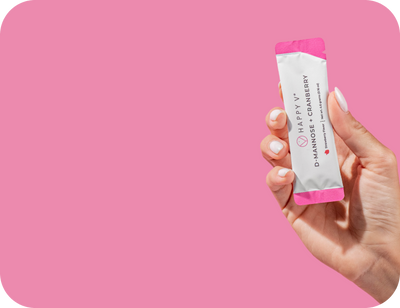- Fact Checked
- June 09, 2025
- 7 min read
Table of Contents
Table of Contents
When you think about bacteria, your first instinct might be to cringe, but not all bacteria are bad news. In fact, your body depends on billions of beneficial bacteria to function smoothly, especially in places like your digestive tract and vagina. And among these, Lactobacillus is a real MVP.
These naturally occurring probiotics play a major role in everything from digesting food to defending against infections. They produce lactic acid to keep harmful microbes in check and help maintain a balanced, healthy environment, whether that’s your gut or your vaginal microbiome. And when things go out of balance, that’s when problems like bloating, bacterial vaginosis, or recurrent infections can crop up.
In this post, we’ll walk through what Lactobacillus actually is, how different strains support your well-being, and why scientists (and wellness experts) are so excited about its potential. Ready to meet your new, all-natural wellness ally? Let’s get into it.
This post is for informational purposes only and does not constitute medical advice. See full disclaimer below.
What Is Lactobacillus?
Lactobacillus is a beneficial bacterium that lives in your gut and vagina and keeps everything working as it should. These bacteria are called probiotics because they help maintain a healthy balance of microorganisms and support your immune system, digestion, and vaginal health.
In the vaginal microbiome, Lactobacillus acts like a natural defense system. It produces lactic acid, which helps keep the vaginal environment slightly acidic, making it harder for bad microbes and pathogens to grow. When Lactobacillus levels are low, harmful bacteria like Gardnerella vaginalis can take over, potentially leading to bacterial vaginosis.
You can boost your levels of good bacteria through eating foods like yogurt, kefir, sauerkraut, sourdough bread, kimchi, and other fermented foods, or by taking a dietary supplement like a probiotic or a probiotic + prebiotic.
Can Probiotics Help Treat BV?
The research is very, very promising! While antibiotics like metronidazole or clindamycin are often prescribed to treat BV, probiotics have been shown to be especially supportive for women experiencing recurring BV.
That’s because probiotic supplements containing specific strains of Lactobacillus can help restore a healthy vaginal microbiome by:
- Reintroducing the “good” bacteria your body needs
- Reducing overgrowth of disruptive microbes
- Supporting your body’s immune system and natural defenses
In preclinical lab testing, Happy V’s Probiotic + Probiotic showed strong antimicrobial activity against Gardnerella vaginalis (aka the main bacteria behind BV). Our formula is designed to be gentle, effective, and backed by science, with no added sugars, fillers, or synthetic preservatives.
Strains That Make a Difference
Not all probiotics are created equal. Different strains of Lactobacillus have unique health benefits, and when it comes to vaginal and gastrointestinal support, a few stand out:
Lactobacillus rhamnosus
This well-studied probiotic strain plays a key role in supporting both vaginal and gut health.
It helps restore the vaginal microbiota and pH, which may reduce symptoms of bacterial vaginosis (BV) and prevent recurrence. L. rhamnosus is also known to produce immune-supporting cytokines and thrive in acidic and slightly basic environments, making it particularly resilient in the gut.
It has shown benefits for inflammatory bowel conditions like irritable bowel disease (IBD) and irritable bowel syndrome (IBS) and may help prevent urinary tract infections. Happy V uses clinically studied strains of L. rhamnosus (HN001) in our probiotic blend, designed specifically for women’s health.
Lactobacillus reuteri
L. reuteri produces reuterin, a natural antimicrobial compound that helps deter harmful bacteria, yeasts, and other pathogens. This probiotic contributes to a balanced vaginal pH and supports urogenital and gastrointestinal health.
Emerging research also shows L. reuteri may improve oral health by reducing pathogens linked to gum disease.
Like other strains in Happy V’s formulas, L. reuteri helps fortify your microbiome from multiple angles.
Lactobacillus crispatus
A powerhouse strain commonly found in the vaginal microbiota of healthy women, L. crispatus produces high levels of lactic acid and hydrogen peroxide, compounds that help prevent bacterial overgrowth and maintain vaginal comfort.
Research suggests it can reduce infections from harmful bacteria, including Chlamydia trachomatis, Candida albicans, and E. coli. It’s a cornerstone of a resilient vaginal ecosystem.
Lactobacillus acidophilus
L. acidophilus is one of the most abundant and essential probiotic species found in both the gut and vagina. It helps prevent the growth of harmful microbes by producing lactic acid, hydrogen peroxide, and bacteriocins, while also crowding out pathogens by adhering to mucosal walls.
In one clinical study, the LA-14 strain (used in Happy V’s probiotic formula, btw) successfully colonized the vagina after oral supplementation with 8 billion CFUs per day. This strain may support symptoms of BV, promote vaginal moisture, help prevent UTIs, and improve gut-related conditions like IBD.
You’ll also find L. acidophilus in many fermented foods like yogurt, kimchi, sauerkraut, and kefir.
Other Potential Benefits of Lactobacillus
While most people associate Lactobacillus with gut health or managing bacterial vaginosis, its reach might extend even further. Ongoing clinical trials and emerging studies suggest that these powerful probiotic bacteria may support a wide range of health conditions across different systems in the body.
Here are a few more health benefits researchers are currently exploring:
May Reduce Allergic Reactions
Some research indicates that taking Lactobacillus probiotics during pregnancy or while breastfeeding may help prevent infants from developing eczema or asthma, both of which are linked to allergic reactions. While more data is needed, early findings are promising.
Helps with Antibiotic-Associated Diarrhea
Antibiotics are known to disrupt the balance of good bacteria in the gastrointestinal tract, which can result in acute diarrhea. Certain strains of Lactobacillus—especially when taken as supplements during or after a course of antibiotics—may help maintain the body’s natural microbiota and reduce the severity or duration of diarrhea in both adults and children.
Supports Urinary Tract Health
In addition to vaginal health, Lactobacillus probiotics may help prevent recurring urinary tract infections. Clinical trials suggest these strains could serve as a gentler, more sustainable alternative to low-dose antibiotics by repopulating the urinary tract with protective microorganisms.
May Lower Cholesterol
Lactic acid bacteria, including L. acidophilus, may help reduce dietary cholesterol absorption. While the effect is generally mild, it contributes to a heart-healthier profile when combined with other lifestyle changes.
May Help Manage Inflammatory Bowel Disease
Because inflammatory bowel disease (IBD) is closely linked to gut inflammation, maintaining a healthy microbiome is key. Some strains of probiotic supplements show promise in reducing inflammation and improving well-being for individuals with IBD symptoms.
Still Being Studied: Constipation, Cold Symptoms & Abdominal Pain
Preliminary research suggests Lactobacillus might help manage constipation, abdominal pain (especially in children), and even reduce the frequency of the common cold. These are exciting areas of study, but more robust data is needed before firm conclusions can be drawn.
Are There Any Side Effects?
Most people tolerate probiotic supplements well. You might notice mild gastrointestinal effects like gas or bloating during the first few days. Typically, that’s just your microbiome adjusting. If you have a weakened immune system or a chronic health condition, it’s always a good idea to speak with your healthcare provider before starting a new supplement.
Final Thoughts
Lactobacillus isn’t just a buzzword. It’s a natural way to level up your wellness routine. For women dealing with bacterial vaginosis, incorporating probiotics with the right species of Lactobacillus can support vaginal balance and reduce the risk of recurring infections.
Happy V’s Vaginal Health Probiotic combines L. rhamnosus, L. reuteri, L. crispatus, and L. acidophilus in a doctor-formulated blend, with no unnecessary extras. And with preclinical data showing action against Gardnerella vaginalis, it’s more than just a probiotic, it’s part of your long-term BV support strategy.
Keep the Conversation Going
- Visit our blog for more on BV treatment options and women’s health tips.
- Join our private Happy V Facebook group to hear from others who’ve been there.
- Explore supplements designed to support your vaginal health journey.
Disclaimer: This blog is for informational and educational purposes only and is not intended to diagnose, treat, cure, or prevent any disease. Statements about supplements have not been evaluated by the Food and Drug Administration. For more information about vaginal infections, visit the CDC or speak to a licensed healthcare provider.
FAQ
Do vaginal probiotics work?
How long does it take for Happy V Prebiotic + Probiotic to work?
Can Happy V Prebiotic + Probiotic be taken with prescription medication?
Our experts continually monitor the health and wellness space, and we update our articles when new information becomes available.
- Published on: June 09, 2025
- Last updates: August 14, 2025
Written by Hans Graubard
Edited by Hans Graubard
Our experts continually monitor the health and wellness space, and we update our articles when new information becomes available.
- Published on: June 09, 2025
- Last updates: August 14, 2025
Written by Hans Graubard
Edited by Hans Graubard













